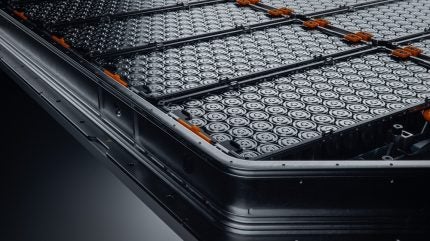
Lithium-ion (Li-ion) batteries are vital both to the energy sector and as key components for electric vehicles (EVs). According to research by GlobalData, EVs will account for 28% of the total light vehicle (LV) market by 2028 and ultimately most LV production in the 2030s, with global sales of EVs rising from three million in 2020 to around 17.3 million by 2025[i].
This surge in EVs, alongside considerable year on year growth in consumer electronics and energy storage, means the total battery energy storage market is estimated to be worth US$10.84 billion by 2026.[ii]
However, GlobalData reports that there will likely be a severe but temporary global battery shortage by 2025 because of this increase in demand for EVs, coupled with a shortage of mined and refined battery metals[iii] due to a lack of investment in new lithium, cobalt, nickel, and manganese mines over the last five years.
The industry is now focusing on reducing its reliance on scarce materials and investing heavily in developing new battery technologies. Most importantly, the sector is creating a global battery recycling industry, which is set to play a significant role in offsetting near-term supply shortages.
Why is there a shortage of critical minerals?
China currently dominates the global lithium market, controlling 60% of processing and refining capacity. It also controls significant mines for lithium, cobalt, nickel, and graphite. Russia, with the world’s fourth-largest reserves, was set to become the second-largest, rare earth element producer after China. However, plans have been frozen due to Russia’s war with Ukraine, which incidentally has the largest lithium reserves in Europe, estimated at around 500,000 tonnes[iv]. Both the US and Europe are now working hard to build their own battery supply chains and develop recycling capabilities to reduce dependence on China.
While battery production capacity is expected to be sufficient to meet the world’s immediate needs, the whole manufacturing process needs an upgrade, with considerable global build-out of new capacity. For example, there are currently plans for hundreds of battery gigafactories in the pipeline worldwide. However, there is the real threat of a lack of low-cost, easy-to-purify raw materials to feed such battery factories.
In response, battery producers are focusing on innovation to improve performance factors like lighter weight, higher energy density, and extended life cycle. Cell manufacturers are using simulation software and AI to develop new materials, chemical combinations and find further efficiencies within the manufacturing process.
But the fact remains that the key metals that currently dominate the scene (lithium, cobalt and nickel) are increasingly difficult to access and purify, and there has been a lack of investment in both mine expansion and bringing new mines online. Although capital markets are beginning to back new mining projects again, in the case of lithium, it takes at least seven years to bring a new mine on stream.
The role of recycling critical minerals
One solution is to massively scale-up the battery and battery materials recycling industry.
In a win-win situation, a circular battery industry will not only reduce dependence on mined rare-earth metals, but also reduce waste and carbon emissions. Recycling materials also reduces dependence on mining output, ore grade, quotas, and geopolitical issues, that make markets volatile. Minimising the environmental impact of mining and product development will have a positive effect on emissions disclosure rules and access to green finance. The EU’s updated battery recycling directive has set lithium recovery targets from recycled batteries at 50% by 2027 and 80% by 2031[v].
Recycling critical minerals not only reduces dependence on an unpredictable and volatile market, but it also helps reduce commodity prices, with recycling expected to become an important part of supply chain diversification. The US, Europe and China are now all investing heavily in battery recycling plants, with McKinsey forecasting annual EV battery recycling revenues, from collection to metal recovery, to grow from just over $2 billion in 2022 to $95 billion in 2040[vi].
Turnkey milling and recycling solutions
Frewitt is a Swiss company that is making major strides in the battery production and recycling industry. With its expertise in powder grinding and milling dating back to 1946, Frewitt has the capacity to mill key battery components for batteries such as graphite and lithium, crucial for low-carbon electric vehicles. Further, Frewitt’s technology can increase the efficiency of solid bulk size reduction of singular battery ingredients and composite materials, helping to reduce waste.
Battery ingredients’ physical properties vary significantly and are temperature sensitive and so require complex processing stages. To recycle materials for reuse in battery components, appropriate conditioning, size reduction, and screening are critical, and all ingredients must be homogeneous in composition for reuse. Recyclable battery material, which includes conductive material, metal casing, cathodes, and anode assemblies, must be broken-up, segregated, and screened before downstream processing.
To this end, Frewitt provides expertise in combining crushers, lump breakers, and extractors to precondition recyclable material for downstream milling and screening, and the company can scale its equipment to meet customer needs – from lab-scale to high volume production levels.
Frewitt offers full turn-key solutions but can also supply critical components for integration into pre-existing recycling lines. The company also provides options such as foreign metal object detection, ensuring the quality and conductivity of battery ingredients is preserved.
To learn more about Frewitt’s milling and battery recycling capabilities, download the free paper below.
[i] GlobalData Thematic Research: Technology Batteries November 2023
[ii]GlobalData: Thematic Research: Technology Batteries in Power
[iii] GlobalData: Thematic Intelligence Technology, Batteries, November 2023
[iv] https://www.energymonitor.ai/tech/electrification/russia-ukraine-war-critical-minerals-energy-transition/
[v] Globaldata: Thematic Intelligence Technology: Tech, Media, & Telecom Predictions 2024, December 2023
[vi] GlobalData: Thematic Intelligence Technology, Batteries, November 2023


